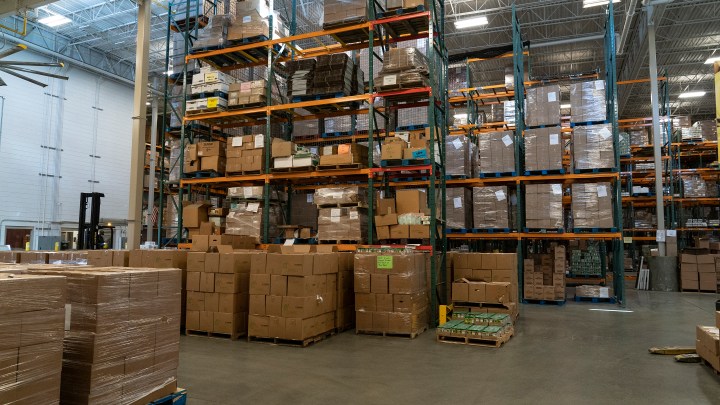
Many companies face a stockpiling dilemma in a pandemic-influenced inventory world
Many companies face a stockpiling dilemma in a pandemic-influenced inventory world

The pandemic put a spotlight on weak links in the nation’s supply chain. There was the hunt for toilet paper at the beginning of the pandemic. Masks, surgical gowns and gloves were hard to find. These shortages were partly blamed on a “just-in-time” inventory system companies have used for decades, ordering just enough parts to come in at just the right time to sell or use on the production line.
But are companies thinking about switching to stockpiling raw materials so they don’t run short?
Saying no to customers
Tom Christie is having to say no to his customers these days. He’s vice president of sales and marketing at Wieland Chase in Montpelier, Ohio, about an hour west of Toledo. Wieland Chase processes scrap copper and brass into rods. Those are used in plumbing, construction and auto parts.
Orders for the company’s rods are skyrocketing — because its customers are stockpiling.
“They’re trying to overorder to fill their inventories to support their customers, because they’re seeing such strong demand through the cycle,” Christie said.
He tells them, “No, I can’t fill your order. I can only give you around 80% of the rods you want.” He’d like to start stockpiling himself, but he can’t.
“Only because we really just don’t have a place to put it,” he said.
Storage space in short supply
That’s because he’d need more storage space, which is expensive and in short supply. Stockpiling is hitting a road block, said Julianne Dunn, an economic analyst at the Federal Reserve Bank of Cleveland.
“I do know that it’s having some impact on the demand for warehousing space,” she said.
Without a warehouse to store their stockpiles, some companies can’t kick the just-in-time inventory habit. It’s not just lack of space — it’s also expensive to just keep inventory lying around. Materials could go out of date in storage. Dunn said it takes much longer now to build up a stockpile, because you have to wait longer to get your orders for raw materials filled.
“Generally speaking, we’re hearing at least double, sometimes triple what would have been normal before the pandemic,” she said.
That may be why, in a survey this spring, fewer than half of manufacturers and constructions firms told the Cleveland Fed they were changing how they manage their supply chains. Dunn said many of those who are turning to stockpiling are just making a temporarily switch.
“I really do feel like the sentiment that we’ve heard is we really hope this is over soon and we can get back to normal,” she said.
“Just-in-time” inventory system
“Normal” being a just-in-time inventory system, which can save money. Parts are delivered just as a factory needs them with minimal, if any, stockpiling.
But “just-in-time” didn’t work so well for a lot of industries during the pandemic. Take the pharmaceutical industry. Hospitals ran short of essential drugs and more. Stockpiling would be expensive for the pharmaceutical industry, said Anna Nagurney, who teaches operations management at the University of Massachusetts, Amherst.
“But, if you can’t deliver, it could be a matter of loss of lives. It could be losing your reputation,” she said.
Nagurney said right now, drug manufacturers import their raw materials — and some finished drugs from China and India — to save money.
Nicole DeHoratius, who teaches operations management at the University of Chicago, said the Biden administration is stepping in to switch at least part of the drug supply chain to domestic sources and create a government stockpile.
“All of us in supply chain were super excited that it got to the attention of the White House,” she said.
DeHoratius said the White House is reviewing the supply chains that are most critical to the security of the United States, “such as pharmaceuticals and, you know, did we have the [personal protective equipment], and which ones do we need to be thinking about, you know, having stuff closer to home.”
Pharmaceutical supply chains
In fact, the Biden administration is already paying a Virginia drug manufacturer around $800 million to start making essential drugs and build a national stockpile of key pharmaceutical ingredients.
“So it is really important to be prepared for all sorts of different disaster scenarios,” Nagurney said.
However, the federal government isn’t helping everyone build a stockpile. Manufacturers and construction firms are still on their own.
There’s a lot happening in the world. Through it all, Marketplace is here for you.
You rely on Marketplace to break down the world’s events and tell you how it affects you in a fact-based, approachable way. We rely on your financial support to keep making that possible.
Your donation today powers the independent journalism that you rely on. For just $5/month, you can help sustain Marketplace so we can keep reporting on the things that matter to you.

















